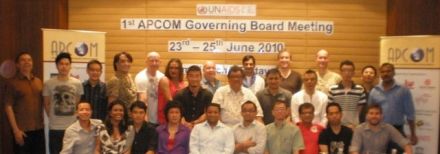The following press statement is issued by APCOM on June 30, 2010. APCOM is a unique coalition of sub-regional and regional MSM and transgender community representatives and coalition sector advisors from government, UN partners, donors, technical experts that are directly working with men who have sex with men (MSM) and transgender people (TG) and HIV. Through increased participation and representation by MSM and TG in regional and global bodies, APCOM seeks to scale up and increase attention to the needs of MSM and transgenders in general and HIV issues in particular. A critical role for APCOM is to assess and track country by country both the degree and quality of inclusion of MSM and TG around HIV issues in national AIDS planning. APCOM also promotes the principles of good practice and lessons learnt to policy makers, service providers and MSM and TG based on qualitative research and cost effective studies.
APCOM First Governing Board sets long-term agenda to tackle HIV among MSM and transgender people in Asia Pacific
Landmark coalition also chooses Executive Director; gets major funding boost

APCOM Board and Secretariat members at meeting
Pattaya, Thailand – The Asia Pacific Coalition on Male Sexual Health (APCOM) has moved from an interim governance structure to one incorporating a Governing Board and an Executive Director, considerably strengthening its capacity to address a sharp rise in HIV infection in men who have sex with men and transgender populations across the region. At the same time, APCOM’s key donor, HIVOS, has announced a renewal of its commitment to APCOM for another three years and at an increase of 50% for core costs.
Like the interim body that preceded it, APCOM’s new, wide-ranging Governing Board continues to include a range of MSM and transgender community representatives from across the region as well as coalition sector advisors from government, United Nations agencies, donors, and technical experts.
“The new roster of representatives marks our transition from a fledgling to an established coalition,” said Shivananda Khan, Chief Executive of Naz Foundation International, from its regional office in Lucknow, India. Khan is also the newly elected Chairperson of the APCOM Governing Board. “In a little more than three years, our unusual coalition has already helped push the HIV and MSM/TG agenda significantly higher on national and regional agendas. This has made crucial issues far more visible, pushing governments and other influential stakeholders to craft and implement long overdue policies aimed at HIV prevention among communities that remain perhaps the most vulnerable to infection both in our region and globally.”

The election of the first Governing Board was accompanied by the naming of Steven Gu as APCOM’s first Executive Director, and with that the imminent shift of the APCOM Secretariat from Lucknow to Bangkok. Gu, who hails from China, is well-known in HIV advocacy and policy on the mainland, and will be based in Thailand to assist APCOM’s outreach to key regional supporters and stakeholders, including the regional offices of the United Nations Joint Programme on HIV/AIDS (UNAIDS), the United Nations Development Programme (UNDP) and the United Nations Educational, Scientific and Cultural Organization (UNESCO), United States Agency for International Development (USAID) and others as well as the Western Pacific Regional Office (WPRO) of the World Health Organization (WHO), which officially joined APCOM at its meeting in Pattaya, Thailand.
APCOM’s work to date received a ringing endorsement at the Governing Board meeting when the coalition’s chief donor, Hivos of the Netherlands (Humanist Institute for Co-operation with Developing Countries), announced it was renewing support for another three years while increasing its funding for the coalition by no less than 50% over its commitment of the past three years.
“We are so very impressed by the groundbreaking efforts of APCOM so far, that our board readily agreed to continue funding these efforts at a considerably higher level,” noted Paul Jansen, Hivos Program Officer for LGBT Rights. “Joining forces with others to bring about important social policy change is crucial to the work of Hivos. APCOM exemplifies that ethic, forging ties across the political and civil society spectrum, bringing diverse parties to the table at the same time to engage in dialogue and advocacy that eventually gets transformed into concrete policy, a verifiable return on investment.”
Representatives at the APCOM Governing Board meeting passed a budget and work plan to build on the accomplishments of the first three years by strengthening and expanding the coalition’s current agenda to encompass areas that include a greater regional push for universal access to HIV prevention, care and treatment services for MSM and TG; increased investment in urgently needed research to better inform service and program design; the strengthening of MSM and TG community networks that engage in policy development; and continued efforts to push for the repeal of laws that criminalize MSM and transgender populations.
“Transgender people are so very different from MSM, yet the world tends to clump us together,” explained Joleen Mataele, Executive Director of the Tonga Leiti Association, Chairperson of the Pacific Sexual Diversity Network and Community Representative from the Pacific on the APCOM Governing Board. “Through the work of APCOM, TG populations from the Pacific and Asia are educating governments and policy makers as to what our specific identities are, what our specific health needs are, not just when it comes to HIV but beyond. APCOM seeks to advocate for and support different communities across different environments, and that is one of its strengths.”
Several APCOM Governing Board representatives will be attending the upcoming International AIDS Conference in Vienna, hosting or otherwise participating in various sessions on MSM and TG issues including the day-long MSM pre-conference of the Global Forum on MSM & HIV. The leadership is also firming up APCOM’s activities to be presented at next year’s 10th International Congress on AIDS in the Asia and the Pacific (ICAAP) in Busan, South Korea, following APCOM’s highly successful series of satellites, meetings and workshops at ICAAP9 in 2009 in Bali, Indonesia.
The new APCOM Governing Board and Secretariat are:
| SUB-REGION/ AREA/AGENCY | Representative | Alternate Representative |
| China* | Fan Lin | Gang Meng |
| Developed Asia* | Stuart Koe, Vice-Chair | Joe Chan |
| Greater Mekong* | Midnight Poonkasetwatana | Vieng Akhone Souriyo |
| India (Interim)* | Manvendra Singh Gohil | Vivek Anand |
| Insular South East Asia* | Dédé Oetomo | Ferdie Buenviaje |
| Pacific* | Joey Mataela | Niraj Singh |
| South Asia* | Shale Ahmed | Sagara Palihawadane |
| Australasia | TBD | TBD |
| APN+ (Asia Pacific Network of People Living with HIV/AIDS) | Andrew Tan | Vijay Nair |
| APTN (Asia Pacific TransgenderNetwork) | Khartini Dinan Bin Slamah | Laxmi Triparthi Narayan |
| China | Dr Xu Jie | |
| Thailand | Dr Cheewanan Lertpiriyasuwat | Khun Yupin Kyn |
| USAID | Clif Cortez | Panus na Nakorn |
| Hivos | Paul Jansen | |
| NFI (Naz Foundation International) | Shivananda Khan OBE, Chairperson | |
| FHI Asia | Philippe Girault | |
| Independent | Jan Wijngaarden | |
| UNAIDS | Geoff Manthey | |
| UNDP | Edmund Settle | |
| UNESCO | R. Jommaroeng (Ohm) | |
| WPRO-WHO | Dr Pengfei Zhao | |
| Executive Director | Steven Gu | |
| Communications Advisor | Roy Wadia | |
| Executive Management Consultant | Paul Causey |
* APCOM operates in 7 Asia Pacific sub-regions: the Pacific (including New Zealand), South Asia (including Mongolia but excluding India), Greater Mekong (GMS), South East Asia (excluding GMS), Developed Asia (Australia, Hong Kong, Japan, New Zealand, South Korea, Singapore, Taiwan), China and India; and two community sub-regions: PLHIV and Transgender. Click here for more info.











 打印版本
打印版本











读者回应
Below are a few ideas that I think would bring anti-HIV efforts to the next level:
1) Telemedicine in India, China and Thailand
-HIV-positive patients (even those in suburban areas) may have their blood samples taken nearby, have them sent to a lab in the city, and obtain their diagnosis and prescriptions online from an Indian, Thai or Chinese HIV specialist.
- For Singapore-based patients, they may have their lab tests done at DSC and their diagnosis and prescription from a Bangkok-based HIV specialist, via the internet conferencing, who then mail the (much cheaper but equally high-quality) medicine from Thailand to their Singapore address. This enables Singapore-based patients to obtain medicine at a lower cost without having to travel overseas physically for every follow-up appointment.
-This would require regulatory and technological improvements to make telemedicine possible in this region, at least for HIV treatment.
-For China and India-based patients, they may access the best- trained specialists who are typically stationed in the major provincial/city hospitals
2) Post-exposure treatment
-Increase awareness of the possibility of post-exposure remedy. While most people know that protected sex prevents infection, the majority do not know that it's possible to undergo preventive treatment AFTER a person has been exposed to HIV.
-The contacts info of clinics that provide such treatments should be publicised. The costs should also be reduced and preferably published to lower the perceived difficulties in obtaining the treatment after one has had a suspected exposure.
3) Career and financial counselling for HIV+
-Campaigns and talks to educate HR professionals about HIV in workplace.
-Jobs matching
-Financial planning for HIV-positive patients
4) Free anonymous testing in more regions, especially crowded urban areas in this region.
-The AFA in Singapore has done a great job providing free testing at least once a year (in December) in all major MSM hangout places. This effort should be replicated in other urban areas in this region, especially those that are more populous and crowded, have a lower GDP per capita, and have more migrant rural workers or job-seekers. Examples are Bangkok, Jakarta, Shenzhen, Beijing, Shanghai, Guangzhou, Chengdu, HCM & Hanooi Vietnam, Manila, Delhi and Bombay.
-If we were to add up the head counts of the MSM in these cities, the figure would cross a million. To provide free testing for more than a million persons every year takes tens of millions of dollars. That's why it's important to form legitimate NGOs like Apcom in order to attract more funding to finance the effort.
请先登入再使用此功能。